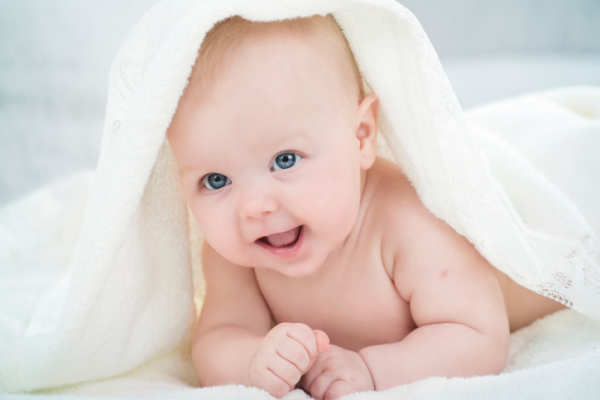Children Need To Talk As Ahead Of Schedule As 7 Months

Babies typically begin talking by their first birthday. However new research recommends conversing with your child invigorates his mind well before she articulates those first words.
For the study, distributed Monday in the diary Proceedings of the National Academy of Sciences, the creators looked at how 7- and 11-month-old children from English-talking families transformed sounds from English and Spanish.
Specialists at the University of Washington took a gander at 57 children who were 7, 11 and 12 months old. The children sat in an egg-molded, noninvasive mind scanner that measures cerebrum initiation and listened to discourse sounds played over an amplifier.
The specialists inspected examples of mind enactment in zones of the cerebrum that dissect sound, and additionally regions that arrange the engine developments needed to create discourse.

At 7 months, babies reacted similarly to sounds from both English and Spanish.
“Children are subjects of the world,” Dr. Patricia Kuhl, the lead scientist on the study, said. “They’re not dedicated to any dialect or any dialects. They’re simply open.”
At 11 months, be that as it may, the newborn children saw more prominent initiation of the engine territories in the cerebrum for English sounds. Kuhl said this proposes that as newborn children’s brains create further, they concentrate in on sounds commonplace to them.
“What we accept is occurring is that the children are kicking the bucket to talk back,” Kuhl said. “It implies that infants even at an early age are honing and practicing and actuating brains in a social manner so that when we serve something to them, they’re endeavoring to volley back.”
These discoveries strengthen the vitality of conversing with your child, rather than simply thudding him or her before the TV.
“At the point when [babies] take a gander at the TV set, they appear intrigued yet their brains don’t learn,” Kuhl said. “Infants perceive and can recognize the sounds just on the off chance that they heard live speakers present to them – just in the event that they were cooperating socially.”
Dr. Gordon Ramsay, executive of the talked correspondence research center at the Marcus Autism Center in Atlanta, said various components are at play when babies figure out how to talk.
“The message for folks is that discourse securing in earliest stages is based upon a framework of tactile experience, engine movement and social association,” Ramsay said. “All these segments need to meet up in the characteristic thunderous coupling between kid, parental figure and environment if each youngster is to advancement along the way to talked dialect.”
Notwithstanding, Ramsay says the study ought to have completed the same children the course of their advancement, as opposed to analyzing diverse 7-month-olds and 11- and 12-month-olds.
“Since formative timing is so imperative, and there is so much variability and postpone inside youngsters, its truly paramount to do longitudinal studies,” Ramsay said.
